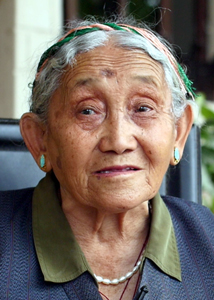Name: Wangmo
(Alias: No)
Gender: Female
Interview Age: 83
Date of Birth: 1934
Birthplace: Sakya, Utsang, Tibet
Year Left Tibet: 1959
Profession: Servant
Monk/Nun: No
Political Prisoner: No

Interview No.: 11U
Date: 2017-04-04
Language: Tibetan
Location: Sakya Tibetan Settlement, Puruwala, Himachal Pradesh, India
Categories: Culture and History
Keywords: business practices/livelihood, childhood memories, customs/traditions, education, escape experiences, Kham, refugee in India -- life as, Utsang
Summary:
Wangmo was born in Sakya in Utsang Province in 1934. Her father was a well-known doctor, but Wagmo's mother was like a mistress to him and he lived elsewhere. Wangmo grazed cows and combed wool when she was a child. Although she preferred spending time playing, a relative taught her how to read.
At the age of 17 or 18 Wangmo began working as a nanny for the two children of Dagchen Rinpoche, revered leader from one of two families heading the Sakya school of Tibetan Buddhism. She talks in detail about her responsibilities as a nanny of such a high-ranking family, who required that the children remain very clean and pure. Although she had many duties, including assisting Dagchen Rinpoche's wife with childbirth, the children also had tutors, playmates and attendants.
As part of the household, Wangmo travelled with the family and their retinue to Nangchen and Derge in Kham to visit the monastery of Dagchen Rinpoche's former incarnation. Later the family was forced to leave Tibet due to the heavy Chinese presence. After reaching India and moving several times, the Dagchen Rinpoche's family received sponsorship to travel to America, but had to leave Wangmo behind in India.
Interview Team:
- Marcella Adamski (Interviewer)
- Tenzin Yangchen (Interpreter)
- Tenzin Choenyi (Videographer)

